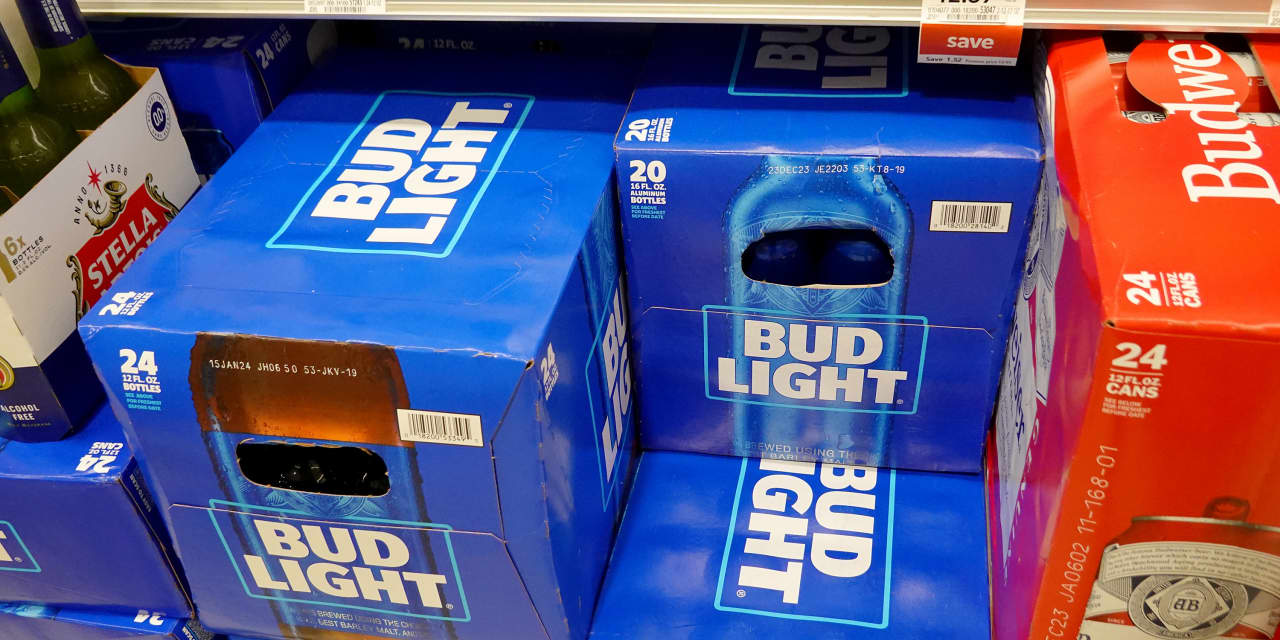Almost a year after Bud Light’s involvement with transgender influencer Dylan Mulvaney triggered a broad consumer boycott of the brand, the beer is still suffering from diminished sales.
Still, Bud’s parent company,
Anheuser-Busch InBev,
managed to increase its profit and revenue on an organic basis in the fourth quarter.
While U.S. revenue declined 17.3%, growth in other markets helped boost revenue 6.2% to $14.5 billion, Anheuser-Busch said Thursday. Analysts surveyed by FactSet had expected revenue of $15.6 billion.
Sales to retailers in the U.S. dropped 12%, driven by a decline in volumes of Bud Light, the company said.
Earnings per share of 82 cents beat expectations for 77 cents, but decreased from the 86 cents in the same quarter a year earlier.
Anheuser-Busch has a wide spectrum of products across nearly all alcohol categories and sells most of them overseas. Less than a quarter of the firm’s revenue comes from North America, and only portions of that is from Bud Light.
Anheuser-Busch’s growth is being driven by price increases, rather than the volume of sales. Total sales volume fell 2.6% in the fourth quarter and 1.7% over the full year, while revenue was up 6.2% and 7.8% respectively.
U.S.-listed shares of Anheuser-Busch declined 3.7% on Thursday. The stock has rebounded after a loss linked to the boycott. It ended Wednesday’s trading session up 3.7% from this time last year.
For fiscal 2023, Anheuser-Busch proposed an increased dividend of €0.82, or 92 cents, a 9% increase from 2022, subject to shareholder approval at the annual meeting in April. It also executed $870 million worth of share buybacks out of the $1 billion authorized in October.
For 2024, the company expects earnings before interest, taxes, depreciation, and amortization to grow between 4% and 8%.
Commentary from management suggests continuing problems with sales of Bud Light. This spring, more than half of retailers have already announced their shelf space plans for 2024, and Bud Light has lost about 1.5 out of every 20 shelves it had, CEO Michel Doukeris said on a call with analysts.
But Bud Light’s losses were partially offset by gains in the firm’s other brands such as Michelob Ultra. And Doukeris said 2024 events such as the Olympic and Copa América could encourage beer consumption.
Since last year, Bud Light has spent millions of dollars on marketing, including a high-profile commercial at the Super Bowl, as it seeks to make a comeback. It also struck a deal to become the official sponsor of Ultimate Fighting Championship in 2024.
Even Donald Trump appears to have sought to take the heat off. In a February post on Truth Social, the former president said Anheuser-Busch isn’t a “woke” company, but simply made a “mistake of epic proportions” and deserves a second chance.
From May 2023, when the marketing backlash began, to February this year, the company has recovered 1.2 percentage points of lost market share, Doukeris said during the earnings call. “I think that we are making progress,” he said. “It’s not at the fast pace that we were expecting or that we’ve been working for, but nevertheless, progress is in place.”
In the two weeks before and after the Super Bowl weekend, Bud Light sales were 30% below where they were a year ago, according to the beverage and alcohol consulting firm Bump Williams. The brand accounted for 7% of all U.S. beer sales, down from 10% in the same two weeks of 2023.
Weaker Beer
Bud Light’s troubles came as the beer industry was already fighting a decadelong decline. Domestic light beer, especially, has been losing market share to premium imported brands such as Modelo.
Sales volume for beer nationwide tumbled 5.8% from a year ago in January, according to Nielsen IQ data. Craig Purser, president of the National Beer Wholesalers Association, warned of an “industrywide, five-alarm fire” in a speech last fall.
Part of the problem is that consumers have more choices. Younger people are less interested in beer and wine, turning to flavored spirits like hard seltzers, cannabis, and e-cigarettes instead.
“It’s a scuffle that’s been going on for a while, and there’s not a ton of optimism,” said Dave Williams, president of Bump Williams.
New Habits
The intense competition makes it especially important for Bud Light to win back its former customers from competitors. It has been challenging so far.
“A good chunk of consumers that left initially have found their alternative, and they’re happy with that alternative,” Williams said.
And changing shoppers’ routines isn’t easy. “A lot of it is about brand loyalty,” said Wedbush analyst Gerald Pascarelli. “People have a tendency to go back to the beers they become familiar with.”
The boycott has hurt other Anheuser-Busch brands as well. Year to date, sales of Michelob Ultra—another top seller at the company—have fallen 3.5% from a year ago, while Budweiser was down 14.5%, according to Bump Williams.
Still, Doukeris noted in Thursday’s earnings call that its premium beers are doing better at attracting new consumers, especially among women and young people.
Avoided Strike
The company managed to avert another potential problem late Wednesday as it reached a tentative agreement on a new labor contract with the Teamsters union. The union, representing about 5,000 workers at 12 Anheuser-Busch breweries, had threatened to strike if a deal wasn’t reached by Thursday.
The tentative five-year deal, subject to ratification by members, would provide job security for all members and a wage raise of $8 an hour, including an immediate $4-an-hour increase in the first year, the union said.
The agreement also includes a $2,500 ratification bonus for every member, high-quality healthcare coverage, and increased pension contributions and benefits.
The union had called out the company’s spending on marketing, which has increased 13% in the first six months of 2023 compared with the year before.
Write to Evie Liu at [email protected]
Read the full article here


